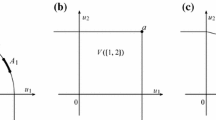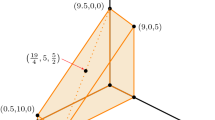Abstract
The multilinear extension of a cooperative game was introduced by Owen in 1972. In this contribution we study the Lovász extension for cooperative games by using the marginal worth vectors and the dividends. First, we prove a formula for the marginal worth vectors with respect to compatible orderings. Next, we consider the direct market generated by a game. This model of utility function, proposed by Shapley and Shubik in 1969, is the concave biconjugate extension of the game. Then we obtain the following characterization: The utility function of a market game is the Lovász extension of the game if and only if the market game is supermodular. Finally, we present some preliminary problems about the relationship between cooperative games and combinatorial optimization.
Similar content being viewed by others
REFERENCES
Driessen, T. S. H. and Rafels, C. (1999), Characterization of k-convex games, Optimization 46, 403–431.
Einy, E. and Wettstein, D. (1996), Equivalence between bargaining sets and the core in simple games, International Journal of Game Theory 25, 65–71.
Fujishige, S. (1984), Theory of submodular programs:a Fenchel-type min–max theorem and subgradients of submodular functions, Mathematical Programming 29, 142–155.
Fujishige, S. (1991), Submodular Functions and Optimization. Amsterdam: North-Holland.
Ichiishi, T. (1981), Supermodularity:applications to convex games and to the greedy algorithm for LP, Journal of Economic Theory 25, 283–286.
Kannai, Y. (1992), The core and balancedness in Aumann, R. J. and Hart, S. (eds), Handbook of Game Theory, Vol. I, Amsterdam: North-Holland, 355–395.
Lovász, L. (1983), Submodular functions and convexity, in Bachem, A. Gröstschel, M. and Korte, B. (eds.), Mathematical Programming:The State of the Art, Berlin: Springer-Verlag, 235–257.
Martínez-Legaz, J. E. (1996), Dual representation of cooperative games based on Fenchel-Moreau conjugation, Optimization 36, 291–319.
Murota, K. (1998), Discrete convex analysis, Mathematical Programming 83, 313–371.
Owen, G. (1972), Multilinear extension of games, Management Science 18, 64–79.
Shapley, L. S. (1971), Cores of convex games, International Journal of Game Theory 1, 11–26.
Shapley, L. S. and Shubik, M. (1969), On market games, Journal of Eco-nomic Theory 1, 9–25.
Weber, R. J. (1988), Probabilistic values for games, in Roth, A. E. (ed.), The Shapley Value, Cambridge: Cambridge:University Press, 101–119.
Author information
Authors and Affiliations
Rights and permissions
About this article
Cite this article
Algaba, E., Bilbao, J., Fernández, J. et al. The Lovász Extension of Market Games. Theory and Decision 56, 229–238 (2004). https://doi.org/10.1007/s11238-004-5650-6
Issue Date:
DOI: https://doi.org/10.1007/s11238-004-5650-6




